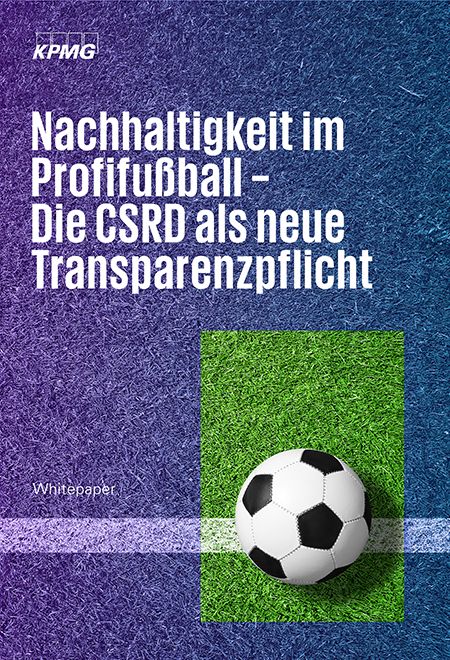What do Bayern Munich, VfB Stuttgart, Werder Bremen and Hamburger SV have in common? They are all affected by the new Corporate Sustainability Reporting Directive (CSRD) and will be obliged to add a sustainability report to their annual financial statements in future. This is because these four and twelve other clubs in the first and second Bundesliga are organised as corporations and their size exceeds a threshold that is relevant for CSRD compliance.

Nachhaltigkeit im Profifußball – Die CSRD als neue Transparenzpflicht
Wer die Vorgaben der CSRD-Richtlinie erfüllt, wird für Sponsoren attraktiver.
Jetzt Whitepaper herunterladenSebastian Pöhler
Partner, Accounting & Process Advisory | ESG Service Group
KPMG AG Wirtschaftsprüfungsgesellschaft
The CSRD is currently on everyone's lips. It obliges large companies in the EU - an estimated 15,000 in Germany alone - to provide comprehensive, standardised and audit-proof sustainability reporting.
The topic of sustainability in professional football is by no means new and is already a high priority for many clubs. However, similar to non-capital-market-orientated companies, there was no regulated and mandatory reporting for a long time. It is generally limited to individual topics with individual focal points that are unregulated and therefore difficult to compare.
The criteria of the CSRD go beyond those of the DFL Sustainability Guideline
A first step in this direction was taken by the DFL, the umbrella organisation of the Bundesliga: A sustainability guideline was anchored in the licensing statutes. However, the scope, binding nature and target group of the CSRD are many times greater, which is why it is now crucial for the clubs concerned to address the establishment of internal processes at an early stage.
ESG reporting - scoring points off the pitch too
In our white paper "CSRD in professional football", we describe the requirements that Bundesliga clubs organised as corporations must fulfil in accordance with the CSRD. And we show how to organise the relevant processes in order to (audit-proof) master the requirements. The enormous media presence and the particular relevance for the economy and society mean that the requirements cannot be implemented incorrectly. All football clubs prioritise integrity and compliance and want to score points with a positive image. The new transparency obligation also allows every club to score points off the pitch.




